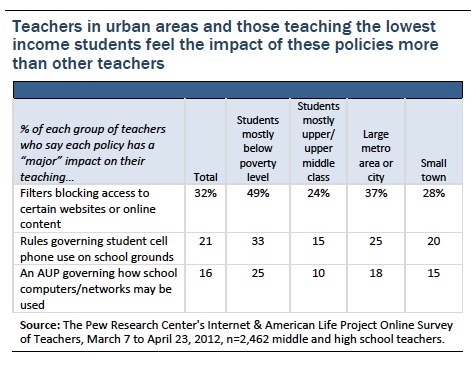Given these findings about how students today define “research” and approach the research process, teachers are faced with identifying and teaching middle and high school students the skills they will need to be smart information seekers in the digital age. The data indicate that teachers in this study place tremendous value on research skills, with most reporting assigning a research paper to their students in the 2011-2012 academic year and spending class time teaching various research skills to their students. These lessons are aimed at addressing deficits they see in today’s students. Most notable among these is the inability to judge the quality of information, a skill the vast majority of teachers deem “essential” for their students’ future success.
Most teachers in the study assigned a research paper in the 2011-2012 academic year
Among the teachers in the study, the majority assigned at least one research paper to their middle and high school students in the 2011-2012 academic year. As the graphic below suggests, among this sample of teachers, short essays and journaling are the most commonly assigned writing tasks, with more than half of the sample (58%) having their students write short essays, short responses, or opinion pieces at least once a week and 41% having students journal on a weekly basis.
Research papers—along with multimedia assignments and creative writing in the form of plays or short stories—are not assigned by many teachers on a frequent basis, but are assigned at some point during the academic year by most of the teachers in our sample. Just over three-quarters of these teachers report having students complete a research paper (77%) or a multimedia project (77%) at some point during the current academic year. Two-thirds (66%) have students complete a creative writing assignment during the year as well, such as writing poetry, a play, a short story, or piece of fiction.
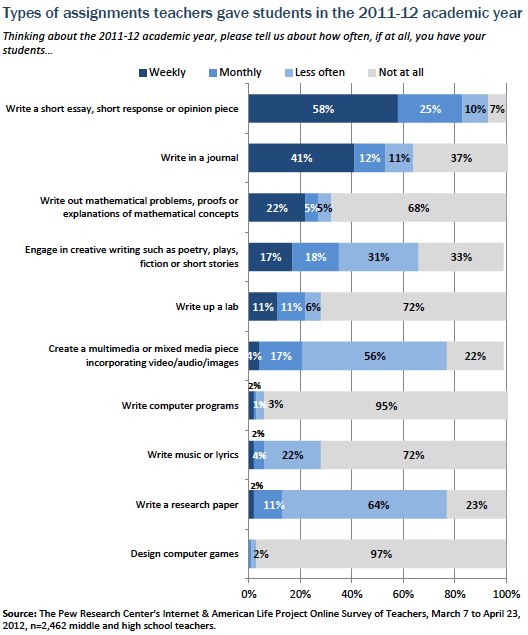
Some teachers are more likely than others to assign a research paper; not surprising given the different skills and subjects being taught. Fully 94% of the English teachers in this sample assigned at least one research paper in the past academic year, compared with 83% of history/social studies teachers, 68% of science teachers, and 36% of math teachers. Almost nine in ten teachers who participated in the NWP Summer Institute (88%) reported assigning a research paper in the 2011-2012 academic year.
Most teachers rate their students “good” or “fair” on a variety of specific research skills
Despite the overall perception that the internet and digital technologies have a “mostly positive” impact on students’ research habits, in most cases the AP and NWP teachers surveyed rate the specific research skills of their students “good” or “fair.” Very few teachers rate their students “excellent” on any of the research skills asked about in the survey.
Overall, teachers gave students the highest ratings on their ability to use appropriate and effective search terms and understanding how online search results are generated. Yet even for these top items, only about one-quarter of teachers rated students “excellent” or “very good.” And in focus groups, many teachers suggested that despite the current generation of middle and high school students being raised in the “digital age,” they are often surprised at how poor their students’ search abilities are.
It kills me to see students typing in whole questions: “What does it mean to leave a digital footprint on today’s society?” into Google. The funny thing is they actually get disappointed when it doesn’t spit back an answer. I have actually found this to be a great lesson on synonyms – helping them to come up with other key words that might be helpful in their search as well. We will also spend some time looking at how advanced searches work. – National Writing Project teacher
Reflecting teachers’ concerns about the impact of the internet on students’ expectations of “instant information,” the skill they rate students lowest on is “patience and determination in looking for information that is hard to find.” Fully 43% of the teachers participating in the survey said that overall they would rate their students “poor” in this regard, and another 35% rate their students “fair” when it comes to patiently pursuing information they need.
A majority of survey respondents also described their students as “fair” or “poor” when it comes to:
- Using multiple sources effectively to support an argument
- Assessing the quality and accuracy of information they find online, and
- Recognizing bias in online content
These relatively low ratings (of what are by and large honors and advanced students) may reflect teachers’ expectations of the skill level they would like to help their students reach, yet survey results indicate that teachers see room for students to improve in most, if not all, of these areas.
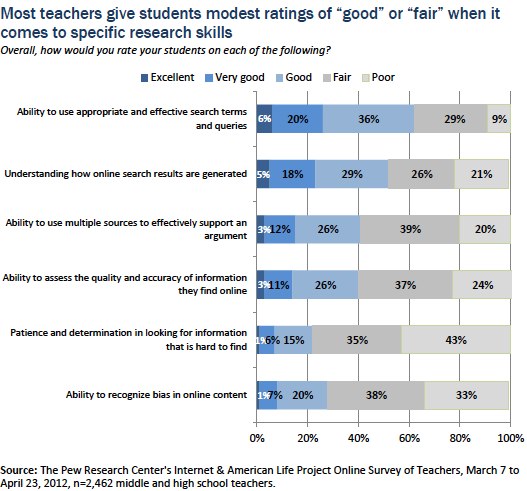
Two patterns emerge in looking at the ratings teachers give their students on their research skills. In the case of all but one skill asked about, more teachers of the lowest income students rate their students “poor” than do teachers of higher income students. The only exception to this pattern is “Patience and determination in looking for information that is hard to find” on which teachers across different socioeconomic levels rate their students equally.
A second consistent pattern that emerges is that teachers with more classroom experience (16 years or more) perceive their students’ skills more positively across the board. Teachers who have been in the classroom for 15 or fewer years, in contrast, seem to have more negative views of their students’ research skills and more of them rate their students “poor” on every skill asked about.
When it comes to patience and determination finding information, the lowest marks come from English teachers, 50% of whom rate their students “poor” in this regard. Looking just at National Writing Project teachers, 53% of this group give their students the lowest rating of “poor.”
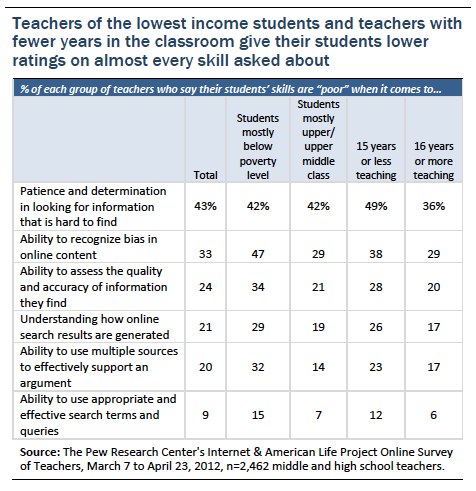
What research skills should be taught?
Both the survey and focus group asked teachers which research skills, in particular, are critical for the current generation of middle and high school students to learn. In focus groups, the most commonly cited skills were how to evaluate the quality of information, how to recognize what information is and is not relevant to the question at hand, and how to synthesize information from multiple sources into a coherent piece of work.
They need to know how to find information and how to judge how appropriate and accurate the material is. They need to be able to assess the biases in their sources. They need to be able to find the material that will help them. –AP US History teacher
[the most critical skill is]
The Internet is empowering, but it’s empowering everyone’s opinion and everyone wants to get their information out there, and we need to try to teach the students to be more discriminators – have greater discrimination about the quality of the information they’re accessing. – Teacher at College Board School
I teach tenth grade and twelfth grade Social Studies. It’s becoming much more important that the students – it’s wonderful to have the access to information – but now more than ever, I feel that they need to be smart consumers of information. And I feel students are progressively losing their ability to sort out what’s good information, what’s reliable information, and basically filter…As schools go on and Internet access becomes more prevalent and computers standard in the classroom, teaching is changing from not just teaching you how to process and restate and think about information, but also we’re going to have to teach them the skill to know how to filter this information. – Teacher at College Board School
Survey findings echo these sentiments. The vast majority of teachers surveyed feel that “courses or content focusing on digital literacy must be incorporated into every school’s curriculum,” indicating just how critical they feel the ability to locate and assess information in the digital world is. About half of the teachers in the study (47%) say they “strongly agree” and another 44% “somewhat agree” with this proposition, meaning that 93% of teachers support this curriculum change. NWP Summer Institute teachers are particularly likely to take this view, with 59% saying they “strongly agree” that this curriculum change is needed. Also expressing strong views on this question are teachers of students living below the poverty line, 60% of whom “strongly agree” such courses are needed.
Moreover, asked to place a value on various skills today’s students may need in the future, “judging the quality of information” tops the list, along with “writing effectively.” These two skills were described as “essential” by 91% of the teachers who participated in the survey. Other skills relevant to the current digital culture also ranked high, with large majorities of teachers saying that “behaving responsibly online” (85%) and “understanding privacy issues surrounding online and digital content” (78%) are “essential” to their students’ later success in life.
While evaluating the quality of information tops the list of essential skills, 56% of survey participants also feel that “finding information quickly” is essential to success. Another 40% describe this skill as “important, but not essential,” indicating that while teachers place tremendous value on teaching their students to assess the quality of information, they also appreciate the importance of speed in today’s fast-moving digital world. Those who have been teaching longer (16 years or more) are slightly more likely than those teaching 15 years or fewer to describe this skill as “essential” (60% of more experienced teachers v. 52% of newer teachers) but otherwise no notable differences exist across subgroups of teachers.
Among the skills included in the survey, those viewed as less essential to students’ success are “presenting themselves effectively in online social networking sites” and “working with audio, video, or graphic content.” Fewer than one in three teachers saw either of these skills as “essential” to their students’ later success, though substantial percentages do describe each of these skills as “important, but not essential.”
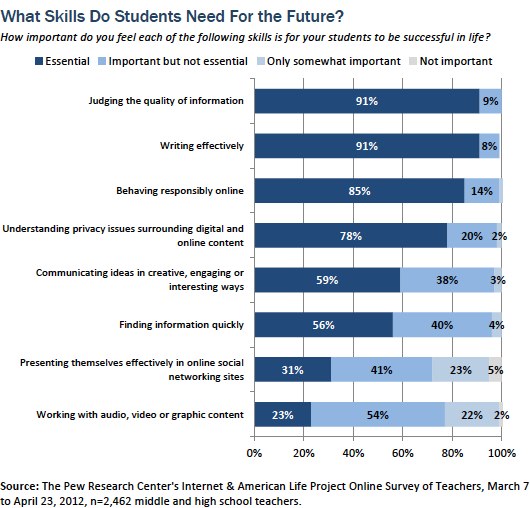
When should these skills be taught, and by whom?
While the AP and NWP teachers in the study generally agreed on what skills are needed and that these skills should be a part of standard curricula, there was less consistency in their opinions of when these skills should be taught and by whom. Asked at what point in their educational careers students should learn these critical research skills, many focus group participants felt they should be taught in elementary school, and that students should already possess these skills prior to entering middle school or high school. Others felt that elementary students may not be ready to learn the nuances of bias, fair use, and salience, and that these more advances skills are better taught later in a student’s career.
The question of who should be mainly responsible for this part of the curriculum was also open to debate in focus groups, with some teachers openly acknowledging that they do not currently feel qualified to teach some of these skills. Some reported that their school’s English department takes the lead in developing research skills, and that their own role is mainly reinforcing these skills. Yet others suggested these skills need to be taught by all teachers across the curriculum, and that library staff can be a key part of that process.
The first thing students need to learn is to discern the quality of a source. After that, they need to be able to compile information from various sources and synthesize their own work, in their own words. Students must cite all sources for their work. This should start in the elementary grades, and does in my district. – AP Chemistry teacher
Credibility, validity, purpose, and reliability are all important aspects to consider when viewing an electronic resource. Also, students need to be aware of how recent web based information is by knowing how to check publishing dates. I think some of these skills can be taught as early as 3rd or 4th grade from the standpoint of ‘how do you know when something is true?’ –AP Biology teacher
Teachers must take the time, and take on the responsibility of teaching students how to search more wisely on the internet. I do not think enough time is devoted to this task because everyone thinks it is someone else’s job to do it…Regardless of what is done, these skills have to be explicitly taught. – National Writing Project teacher
I find that my students do not have sound research skills in place in the 8th grade…and I’m not so certain that it is the best use of their time to tackle an isolated weighty research project. My instincts tell me to develop ongoing research expectations, in smaller, manageable chunks, so that they receive more guidance on more of the work/research. I’d rather know that my students had a chance to get better at the process of reading and researching for one focused idea than raking them through a project just to rake them through a project. There is less of chance that a student would plagiarize and an even better chance that they would learn what the difference is between work that is plagiarized and that which is not. – National Writing Project teacher
I demonstrate how to do good research in my class and then I assign projects and papers where they have to research. I do source checks before the projects are due to make sure students are on the right track. I really rely on skills they learned in their English classes. –AP Biology teacher
I try my best to teach students how to choose credible sources, but I rely on the expertise of others for the ins and outs of this very difficult to navigate lesson. Thank goodness there are so many resources to help me with this, but I admit. I have to do more. – National Writing Project teacher
Current approaches to teaching critical research skills
Asked about different approaches they use to develop effective research skills in their students, two different tracts emerge—first, spending class time teaching and developing these skills, and second, designing assignments that require students to use new or different approaches.
In terms of devoting class time to this area, fully eight in ten of the AP and NWP teachers who participated in the survey report spending class time discussing how to assess the reliability of online information, and seven in ten spend class time generally discussing how to conduct research online. Fewer teachers, but still a majority, say they spend class time helping students improve search terms and queries, yet just one-third devote class time to helping students understand how search engines work and how search results are actually generated and ranked.
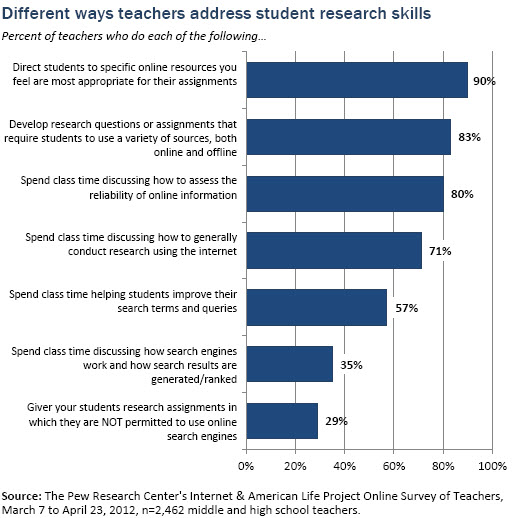
A second strategy these middle and high school teachers use is intentionally constructing or shaping research assignments in ways that either direct students to the best online resources, or require students to expand the repertoire of sources they use. Nine in ten survey respondents report directing their students to specific online resources they feel are most appropriate for a particular assignment, and 83% develop research questions or assignments that require students to use a variety of sources, both online and offline. Substantially fewer teachers, just 29%, assign work to students in which they forbid the use of online sources.
Suggestions in the focus groups that English teachers generally take the lead on teaching these skills were echoed by survey results. English teachers in this sample are the most likely to report implementing each one of these lessons/approaches, followed closely by history/social studies teachers. For example, 93% of English teachers in the sample report developing assignments that require students to use a variety of sources, followed by 91% of history/social studies teachers, 77% of science teachers, and 47% of math teachers. Similarly, when it comes to spending class time discussing how to assess the reliability of information, English teachers take the lead (94%), followed by history/social studies teachers (90%), then science teachers (69%) and math teachers (46%).
The merits of these latter strategies—structuring or shaping assignments in ways that required students to use particular sources or more varied sources—was discussed at length in focus groups. Many teachers reported requiring students to utilize offline resources in an effort to familiarize them with materials they might not otherwise use. Others said they stress to their students the importance of paying attention to website domains, and encourage or require them to use .gov, .org or .edu sites. And many teachers reported banning the use of particular online sources, most commonly those with user-generated content such as Wikipedia, or telling students exactly which online resources are most useful or even permissible for particular assignments.
At the same time, teachers felt that eliminating the use of all online resources or even particular online resources in assignments is unrealistic and can be counterproductive. Because students are already reliant on these sources when they arrive in middle and high school, and have a comfort level with them, many teachers feel a better approach is to teach students how to use these tools effectively. Indeed, in student focus groups, teens acknowledged that even when they are “not allowed” to use Wikipedia in their research, it is still often their “first stop” in completing an assignment. Students feel that Wikipedia’s fairly short encyclopedic entries provide them with a quick “overview” of a topic from which to orient their research process, and some teachers agreed. Thus, rather than attempt to control which websites students utilize in completing school assignments, or even their very use of online resources, the underlying philosophy for many is teaching their students to be better information consumers in the digital arena.
I’d take the choice out of it. I’d tell them which sources to access, because the bottom line is, I’m so pressed for the time that rather than risk them going out and finding the wrong information, I tell them what sources to access and then you give them five sources and you say, ‘These are the approved sources. Do not go outside this realm.’ And ultimately that’s probably self-defeating because they’re not always going to be given that narrow focus like that, but I don’t teach in a theoretical world. – Teacher at College Board School
We almost do the opposite in our classroom. I’m a special education teacher and we tell them what sources we don’t like and so now they can tell us what sources we don’t like that they shouldn’t use. – Teacher at College Board School
I assign work that requires them to use online resources such as JSTOR, EBSCO, Proquest, and other databases to which our school subscribes. –AP English Language teacher
[domain]
I demonstrate how to do good research in my class and then I assign projects and papers where they have to research. I do source checks before the projects are due to make sure students are on the right track. I really rely on skills they learned in their English classes. –AP Biology teacher
Credibility and usefulness of sources is a part of every conversation about research/inquiry projects that we undertake. This can take many forms. For some assignments I have mandated that kids solely get research from articles found in one of the databases the school subscribes to. For other projects we discuss this idea of credibility and I walk around and look at where they’re headed for research and if I need to step in and start a conversation about a particular source my student and I have that discussion. – National Writing Project teacher
Many focus group participants also reported assigning a large research project to be completed over the course of the full academic year, which they can break into smaller steps to help students develop an understanding of the various pieces that go into successful research as well as the time that must be devoted to each. In designing these research assignments, focus group participants suggested the following elements are particularly important:
- Showing students how to develop a focused research question and a plan of what they should be looking for, to help them “sort through the noise”
- Requiring students to utilize more than online resources
- Teaching students how to properly cite the sources they use, particularly online sources
- Developing a student’s ability to determine the timeliness, relevance, and quality of the online information they find
- Teaching students how to appropriately paraphrase and synthesize information
[research]
In all of my classes, we are visiting the library/lab on some kind of regular basis whether it’s for a persuasive essay, speech, research paper, etc. Students mark up the article, find the author’s argument/thesis, create their own, find opposing views, find supporting views, etc. These are all research skills—break it down (analyze) to write it down (synthesize). –AP English Language teacher
Much of searching for information today is about evaluation of sources. Students often stick to what they know and they often do not expand on utilizing their search skills, so yes, I teach them about it. They tend to stick to Google. I challenge them to use various sources and explore databases. When teaching this I often explore various false sites with them. Sometimes I establish various credibility tests. I find fun material and they have to determine if it is credible or not and why. I pull material from various websites, to tabloids, to internet email hoaxes, to credible sources. They decide if it is credible material or not and how to determine if something is credible. We explore various criteria for exploring if something is credible. I also teach this with visual literacy and we explore doctored images, etc. I love pulling an image of a website that states that something happened to their favorite celebrity. They debate what is true and how to find the truth. – National Writing Project teacher
At least half of my curriculum is devoted to doing research online. We spend a lot of time noticing differences between sources, but without judgment. Instead of asking about the credibility of sources, we spend a lot more time wondering if a particular source is of value to my writing. A personal reflection in a blog might provide the perfect turn of phrase to quote in your own argument. We also spend a lot of time teaching student how to cite their sources, and in this process we talk about reliability and the need to have more than one source, no matter where it comes from. I could go on for some time about this. It is the heart of my work with students, but it isn’t something that easily fits into a set of lessons. There are slowly evolving critical lenses that I see my students beginning to use when they are immersed in self directed, passion-based projects. The simple ways of determining credibility just don’t make sense. Who is to say that a podcast is less reliable than a Wikipedia page. A lot depends on your purpose, your critical use, and the other sources that surround any one source. It’s too complicated to teach outside of the ongoing practice of doing research. – National Writing Project teacher
Usually when we are doing some kind of research in my class I will scaffold it enough where students have a pretty good idea where to go, but the issue also becomes what do they do when they get to where they need to be. I read an interesting study about how people read websites, much different based on age and much different than we read print. I usually bring this study up with the kids so we can have conversations about how to best use our time and find the best information. – National Writing Project teacher
I usually preface a long-range research assignment with a challenge of my own. I’ll remind them of our discussion about “Is Google Making us Stupid?” where they essentially said that their generation is being dismissed too quickly by the pundits who say they can’t think deeply. When I remind them that a lot of people say that their generation wants instant gratification of information, that raises some hackles. If they’re aware of the obstacles of an in-depth assignment, they’re more prepared to challenge those assumptions. I guess I’d say that a big part of my teaching is attuning my students to how we think as we move through the research process. Make those negative assumptions part of the discussion and a lot of the students see that as a call to move past them. My students aren’t shallow, lazy and stupid, and they don’t want to be thought of as such. – National Writing Project teacher
Challenges to teaching research skills in today’s digital environment
In general, the AP and NWP teachers in the study feel their students are very receptive to learning effective research skills, but point out that teaching these skills is not without challenges. By far, the most commonly cited challenge is simply a lack of time to devote to developing effective lessons and teaching skills in class. Teachers repeatedly noted the difficulty in covering these skills in addition to the other content they are required to cover. They also note that they themselves must become savvy information consumers before they can impart these skills to their students.
Among other challenges teachers report facing are pay walls separating them and their students from the best information online and digital access issues among their students. Teachers stressed that the best, most credible resources on the internet are often available only by subscription, thus many schools and students do not have access to what is truly the highest quality information in a particular field. In addition, they point out that for many of their students, research time is restricted by a lack of internet access at home and/or limited library hours.
The biggest challenge in any AP class in my experience is time. The volume and depth of the material is so extensive that finding the time to teach effective research is very difficult. – AP US History teacher
Time. There is never enough time to get through all of the standards and spend adequate time teaching research skills also. It takes a lot of time to do justice to teaching research skills. – AP Biology teacher
Time and access to technology are always hurdles to teaching anything. A lot of times we assign a research assignment and turn the students loose into the world to research on their own. Too often, parents do not even know what is going on in regards to this. Maybe we should work harder on getting them involved in this process. Most students are receptive to methods that will speed their research but not with what will make it better. This is another obstacle to overcome. – AP US History teacher
The other problem is the…limited number of resources that are available for free; most of the primary resources, most of the better resources have to be paid for by subscription. – Teacher at College Board School
[other teacher]
If we had laptops in every room, we would be able to champion tat cause of ‘this is how you do research’ more, rather than just showing them our laptop….They have to do the research at home and they’re kind of on their own. We give them pointers, but… – Teacher at College Board School
The survey also indicates that these teachers face a variety of challenges in effectively incorporating online content and digital tools into their classrooms, some of which may hinder their ability to teach students how best to conduct research online. Virtually all teachers surveyed report working in a school that employs internet filters (97%), formal policies about cell phone use (97%), and acceptable use policies or AUPs (97%). The degree to which teachers feel these different policies impact their teaching varies, with internet filters cited most often as having a “major impact” on survey participants’ teaching (32%). One in five teachers (21%) say cell phone policies have a “major” impact on their teaching, and 16% say the same about their school’s AUP.
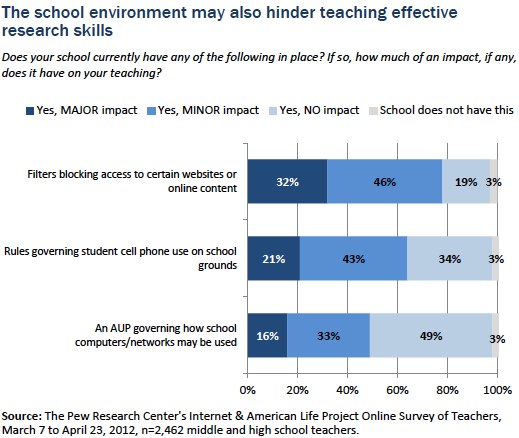
Looking more closely at subgroups of the teachers surveyed, it becomes clear that those teaching in urban areas and those teaching the lowest income students are feeling the impact of these types of restrictions more so than those living in other community types and those teaching students from mainly upper and upper middle income households. In particular, teachers of students living in poverty are at least twice as likely as those teaching the most affluent students to report these policies having a “major” impact on their teaching.
